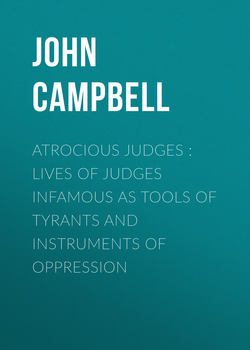Atrocious Judges : Lives of Judges Infamous as Tools of Tyrants and Instruments of Oppression

Реклама. ООО «ЛитРес», ИНН: 7719571260.
Оглавление
John Campbell. Atrocious Judges : Lives of Judges Infamous as Tools of Tyrants and Instruments of Oppression
ADVERTISEMENT
INTRODUCTION
CHAPTER I. ROGER LE BRABACON
CHAPTER II. ROBERT TRESILIAN
CHAPTER III. THOMAS BILLING
CHAPTER IV. JOHN FITZJAMES
CHAPTER V. THOMAS FLEMING
CHAPTER VI. NICHOLAS HYDE
CHAPTER VII. JOHN BRAMPSTON
CHAPTER VIII. ROBERT HEATH
CHAPTER IX. ROBERT FOSTER
CHAPTER X. ROBERT HYDE
CHAPTER XI. JOHN KELYNGE
CHAPTER XII. WILLIAM SCROGGS
CHAPTER XIII. FRANCIS NORTH
CHAPTER XIV. EDMUND SAUNDERS
CHAPTER XV. GEORGE JEFFREYS.113
CHAPTER XVI. ROBERT WRIGHT
APPENDIX
No. I
No. II
No. III
No. IV
No. V
Отрывок из книги
Hume observes, in his History of England, that “among a people who lived in so simple a manner as the Anglo-Saxons, the judicial power is always of greater importance than the legislative.” The same comparison will hold good even in communities far more advanced in civilization than the Anglo-Saxons. It has indeed been well said that the great end of the complicated machinery of the existing British government is to get twelve men into a jury box. It might even be laid down as a general principle that the freedom or servitude of a people will mainly depend upon the sort of administration of justice which they have – especially of criminal justice.
The whole course of British history will serve to justify this observation, since it has not been so much by the aid of mercenary soldiers, as by the assistance of lawyers and judges, that tyranny has sought to introduce itself into that country. It is in the history of the English courts, still more than in the history of the English Parliament, that we are to trace the origin and growth of those popular rights and of that idea of public liberty, propagated from England to America, and upon which our Anglo-American free institutions are mainly founded.
.....
Already, previous to this fracture of the Aula Regis into the various courts above named, the legal profession, so far as practice in the lay courts was concerned, had begun to separate itself from the clerical; and places for the education and residence of a class of laymen who began to devote themselves to the study of the common law were established in the vicinity of Westminster Hall. Of these, Lincoln’s Inn, founded at the commencement of the reign of Edward II., (about A. D. 1307,) under the patronage of William Earl of Lincoln, who gave up his own hostel or town residence for that purpose, was the earliest, and has always remained the principal. On this model were established before long the Inner and Middle Temple, (so called because a residence of the Knights Templars, forfeited by the dissolution of that order, had been devoted to this purpose,) Gray’s Inn, Serjeant’s Inn, and the Inns of Chancery.
Such was the origin of the profession of law as it still exists in England and America; of that body of lawyers whence all our judges are taken, arrogating to itself, after the example of the churchmen, of which it originally consisted, a certain mystical enlightenment and superiority, scouting the idea that the laity, as the lawyers too affect to distinguish all persons not of their cloth, – in plain English, the people, – should presume to express or to entertain any independent opinion upon matters of law, or that any body not a professional lawyer can possibly be qualified for the comprehension, and much less for the administration, of justice.
.....